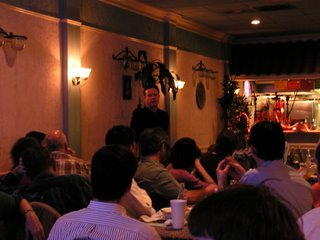Working toward social change, or any change that would benefit a collective, should be consider not just on the level of the group but also on an individual level. I would be interested to hear from people about how they have felt, seen witnessed a consciousness-change.
What are the steps?
- What activities may occur concurrently?
- What phenomenon tends to co-occur?
- How can we assess progress?
- How can we coordinate with others so that the change we work toward becomes a part of the system of day-today life?
The changes we make in how we see our world may benefit us immensely, not just in terms of our peace of mind and physical health, which are indeed fabulous and amazing things, but also in terms of our financial security!
To be productive for one's job or at school it helps if you have head a good night’s sleep, if your belly is full....to obtain these things it is best if you are paid a wage that promotes your ability to have a life where you can ensure your own productivity through your own well-being.
To work without sight of how to benefit yourself, to purchase without sight of how you benefit yourself is to stay locked into the dissatisfaction of the consumer society lifestyle: we do not know what we want, but we are sure that we do not have it. If we have a job and can keep our heads about total bankruptcy, then we are fine. If we have a little something stashed away, excellent. BUT, how does this cycle help us to advocate for change in our society that will help us move into a place where we are not just maintaining a sense of security for ourselves and our small family unit, but where we are building security for our neighborhood, our community, our nation, and our globe?
There are many issues in politics that get people worked up.
Those that make the most sense at this time are voting procedures and campaign reform. We want candidates who will not be owned by special interests and who will feel supported by the large constituency that is (possibly) best represented by a grassroots base.
But how to develop that grassroots base, get decent, fiscally responsible, progressive, pragmatic, and honest politicians and appointed officials in place? How to get an active group of voters who will PARTICIPATE in issues like a living wage, safe and cost efficient transportation and infrastructure, as well as affordable health care and coverage?
Good politicians in place is half of what we need in America; we also need active constituents who will offer ideas for solutions to social problems, people who will tell their stories that will influence policies that will ensure each citizen the means to be emotionally, physically, and financially secure!
For me, the question of how to get people to work together to help work on SOLUTIONS to social problems is a constant: mainly because of how my work as an instructor of education overlaps with the potential I see with Democracy for Virginia and the Democracy for America linkup meetings. I think that there needs to be a constant maintenance of relationships to build social networks and turn a group into a team, so that eventually each team can implement an action plan and assess their own progress as well as the progress of the network.
The issue many others may see with this part of the plan is that it is very time consuming. Instead of team building, you may be more likely to see are a few motivated individuals who are leading a group of loosely connected people rather than a strong collective of shared, interconnected actions and responsibilities. Unfortunately, when those few individuals are burned out there may be no one to take their place and the learning curve is so high that those who do take over can not pick up where things were left off.In addition to team building, there also needs to be personal reflection. While assessing how teams are doing while making coordinated actions for change, each team member needs to also be reflecting on:
- Motives
- Individual actions (what did they actually DO...this might differ from what others believed this person has contributed)
- Attitudes, and responses to how other people have behaved during group actions
Reflecting on your individual role may help soothe differences that have arisen over ego and help keep a person in sight of how what he/she wants and believes is best may or may not be in line with the team or the network of teams' mission may be.
Keeping track of what you want and why you want it as well as how you act and why you acted that way may help keep people involved as they reaffirm their presence in a group and as they develop working relationships that are based on participating and being connected to others!
I wonder how people improve their teaming relationships in other forums besides teaching or public activism. I wonder how we improve our teaming in our lives as family members as well as in the work world.
Do people want to change?
Do people want to improve conditions, or are they only interested in promoting their vision of the world?
I think that is the main question that needs to be addressed is HOW to help improve individuals' capacity to team together and work toward any collective goal.










